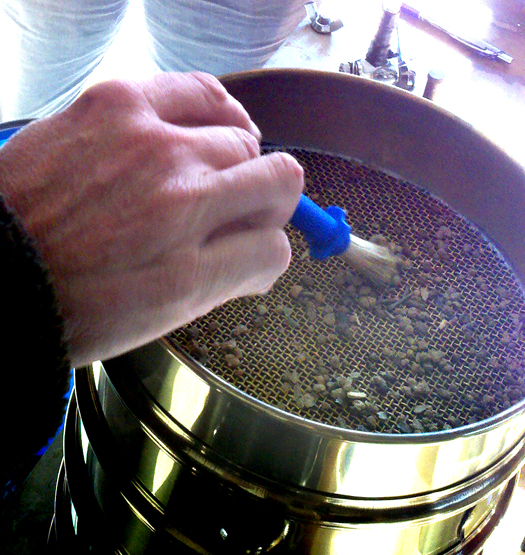The Soil Beneath Our Feet
Soils Laboratory
Soil is the ultimate product of the breakdown of rock through chemical and physical processes. In the  Piedmont region, many areas contain a fairly thick layer of soil residuum that overlies bedrock. This critical resource provides a medium in which to grow food, break down wastes, and filter precipitation for water supplies. Soil is even used in construction industry as engineered fill material.
Piedmont region, many areas contain a fairly thick layer of soil residuum that overlies bedrock. This critical resource provides a medium in which to grow food, break down wastes, and filter precipitation for water supplies. Soil is even used in construction industry as engineered fill material.
The physical nature of soil plays an integral role in determining the suitability of the material for these and other purposes. Therefore, the ability to classify and quantify these characteristics is vitally important in determining how the soils can best be used for human benefit, and how these factors may affect the magnitude of releases of environmentally sensitive substances to the earth’s surface. This is especially true in predicting how toxic and hazardous materials will move through soil materials. As such, the soil material is a critical mechanism in controlling the magnitude and extent to which these substances will migrate from a point of release.
Northwest Geoscience, PC maintains a soil laboratory capable of measuring these critical characteristics of soil materials in order to provide quantitative data to its professional staff of geologists, hydrologists, and environmental scientists, as well as professionals from other firms. These data can then be used in such diverse applications as predicting the time required for contaminants from a spill at the earth’s surface to migrate to the groundwater table, or whether a particular soil is suitable to be used as a seal to prevent water in a lake or reservoir from seeping or causing internal erosion of an earthen dam.
![]() The soil testing follows procedures established by the American Society of Testing and Materials (ASTM) where applicable so the test results can be used for regulatory purposes as well as in construction projects. Before beginning a soil testing project for other consultants, we discuss the specific information that is needed and whether specific methods are required. We then identify the suite of tests that will provide the quantitative data needed by the client for a particular project.
The soil testing follows procedures established by the American Society of Testing and Materials (ASTM) where applicable so the test results can be used for regulatory purposes as well as in construction projects. Before beginning a soil testing project for other consultants, we discuss the specific information that is needed and whether specific methods are required. We then identify the suite of tests that will provide the quantitative data needed by the client for a particular project.
We commonly perform characteristic tests such as grain size, Atterberg limits, natural moisture content, and specific gravity to allow for the classification of soils according to the Unified Soil Classification System (USCS), which is commonly used for most engineering related purposes. Further, we have the capabilities to measure permeability, determine the moisture-density relationship (Proctor) of soil, and measure the infiltration rate of soils in the field.
